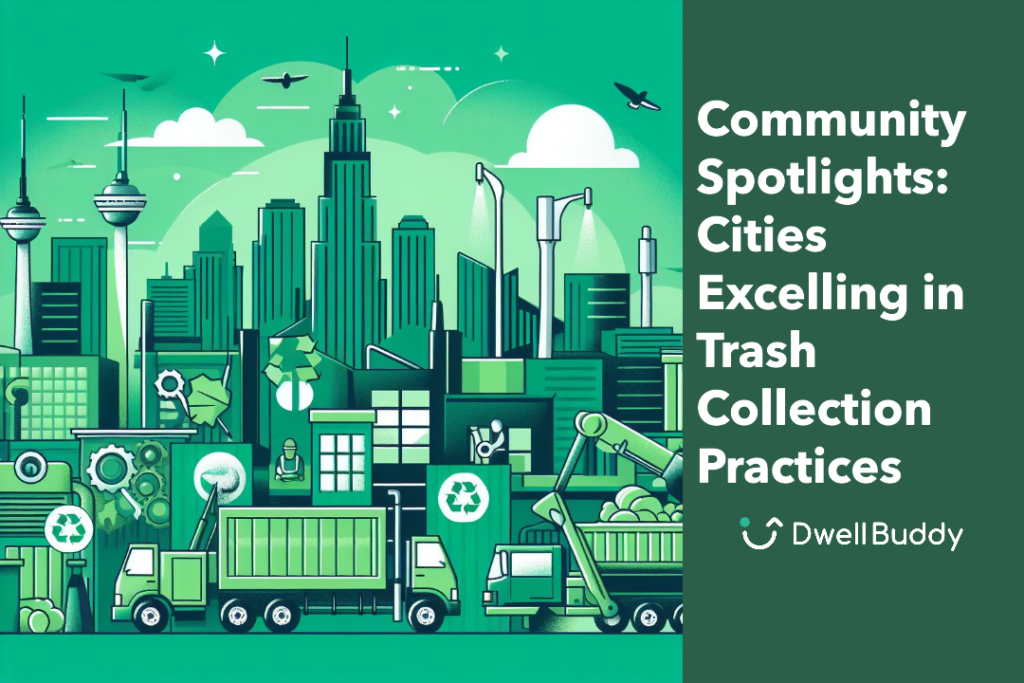
Community Spotlights: Cities Excelling in Trash Collection Practices
The world’s urban areas continue to grow, and with that growth comes the ever-present challenge of waste management. Proper waste collection and waste management are cornerstones of clean, healthy and sustainable cities. This blog post shines a light on a few communities that excel in waste collection practices, highlighting their innovative approaches and successful programs that can inspire others.
Factors Contributing to Effective Trash Collection
- Infrastructure Improvement: Modernizing waste collection vehicles with features like automated arms and improved fuel efficiency can significantly streamline operations. Upgrading disposal facilities with advanced sorting and processing technologies allows for better waste segregation and resource recovery.
- Technology Integration: Smart bins with real-time fullness sensors can optimize collection routes and reduce unnecessary pickups. Implementing GPS tracking systems on collection vehicles can further improve efficiency and accountability.
- Community Engagement: Educating residents about proper waste sorting, recycling guidelines, and scheduled collection times fosters a sense of ownership and responsibility. Interactive campaigns and community workshops can further increase awareness and encourage participation.
- Government Support: Enacting and enforcing clear waste management policies, including regulations on landfill use and mandatory recycling programs, provides a strong framework for effective waste management. Offering incentives for recycling, such as tax breaks or discounts on utilities, can further incentivize residents.
Cities Leading the Way in Sustainable Waste Management
Several cities around the world are setting the bar high for sustainable waste management practices:
- Singapore: This global metropolis boasts a comprehensive waste management system that includes a network of highly efficient recycling facilities and state-of-the-art waste-to-energy plants, significantly reducing the amount of waste sent to landfills.
- San Francisco: San Francisco has embarked on an ambitious “zero waste” program, aiming to divert all waste from landfills by 2030. They’ve achieved remarkable progress through aggressive composting initiatives, expanded recycling programs, and public education campaigns.
Learning from the Leaders: How to Implement Sustainable Waste Management
Cities looking to improve their waste management practices can learn valuable lessons from these leaders:
- Research Best Practices: Don’t reinvent the wheel! Dedicating resources to studying successful waste management models implemented in other cities can provide valuable insights and inspiration.
- Set Clear Goals: Establish achievable and measurable targets for waste reduction and recycling rates. Having well-defined goals creates a roadmap for progress and allows for tracking achievements over time.
- Collaborate with Stakeholders: Effective waste management requires a collaborative effort. Working closely with local businesses, residents, and waste management companies fosters a sense of shared responsibility and ensures everyone is on the same page.
Innovative Recycling Programs: Turning Trash into Treasure
Innovative recycling programs are a game-changer in reducing waste and promoting sustainability. Here are some inspiring examples:
- Portland, Oregon: This environmentally conscious city has implemented a comprehensive curbside composting program, diverting food scraps and yard waste from landfills and turning them into nutrient-rich compost for local gardens and farms.
- Kamikatsu, Japan: This small town in Japan has achieved an astonishing near-zero waste rate by prioritizing recycling and reuse. Through extensive community engagement and a focus on reducing packaging at the source, Kamikatsu has become a powerful model for sustainable waste management practices.
How to Implement Innovative Recycling Programs
Here are some strategies to get your community on board with innovative recycling initiatives:
- Educational Campaigns: Launch engaging and informative campaigns that raise awareness about the importance of recycling and proper waste sorting practices. Utilize various communication channels, such as social media, public service announcements, and community workshops.
- Convenient Recycling Facilities: Make recycling accessible and convenient by providing easily accessible recycling centers with clear signage and well-maintained bins for different materials. Explore options for offering single-stream recycling, which simplifies the sorting process for residents.
- Incentives for Recycling: Implement reward programs that incentivize residents to participate in recycling actively. This could involve offering discounts on waste disposal fees, awarding points for recycled materials that can be redeemed for rewards, or organizing community recognition programs for top recyclers.
Final Thoughts
Effective waste management is the backbone of sustainable cities. Inspired by leaders like Singapore and San Francisco, cities can adopt a multi-pronged approach: modern infrastructure, smart technologies, and community engagement. Collaboration between residents, businesses, and governments with clear policies and incentives is key.
Innovative recycling programs hold immense potential. From Portland’s curbside composting to Kamikatsu’s focus on waste reduction, cities can transform waste into resources. Education, accessible recycling facilities, and reward programs further increase participation. By viewing waste as an opportunity, cities can create a cleaner, greener future. Let’s collaborate and embark on this journey together.

